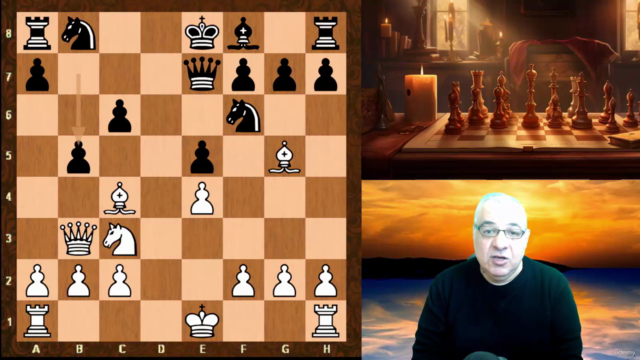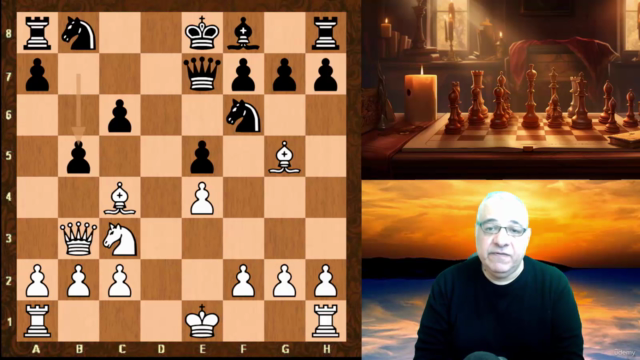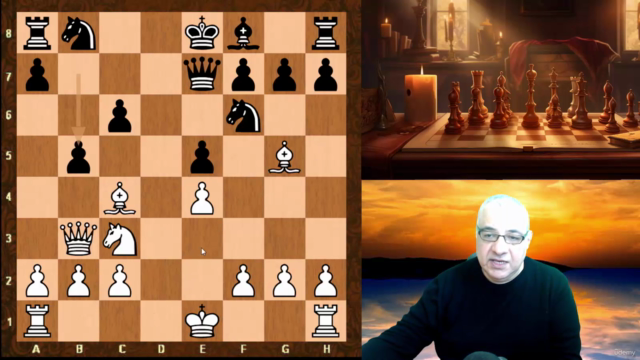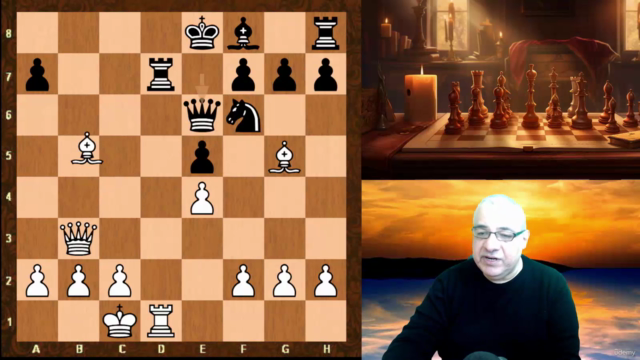The Complete Guide to Chess Opening Principles
Master Chess Opening Principles – Improve King Safety, Central Control, Development & Practical Understanding (0–1600)
4.75 (2 reviews)

56
students
22.5 hours
content
Apr 2025
last update
$19.99
regular price
What you will learn
Ability to prioritize king safety above all else in the opening.
Ability to identify when a king is dangerously exposed in the center.
Ability to control key central squares like e4, d4, e5, and d5 early.
Ability to evaluate whether a move contributes to king safety.
Ability to assess whether a developing move helps control the center.
Ability to understand the practical value of open files and diagonals.
Ability to spot common traps caused by neglecting king safety.
Ability to distinguish between safe development and risky material grabs.
Ability to avoid premature queen development.
Ability to develop knights and bishops to their most active squares.
Ability to delay non-essential pawn moves in favor of development.
Ability to avoid castling into an attack.
Ability to build toward a safe middlegame position.
Ability to punish opponents who violate core opening principles.
Ability to use the center as a base for piece coordination.
Ability to avoid leaving pieces unprotected during development.
Ability to connect the rooks efficiently after development.
Ability to recognize and apply central pawn breaks at the right time.
Ability to develop pieces with a future plan in mind.
Ability to identify when it's necessary to move the same piece twice.
Ability to avoid creating early pawn weaknesses in the structure.
Ability to create a solid pawn structure that supports your king.
Ability to use open lines for rook activity.
Ability to assess if a move is purposeful or just “effective.”
Ability to evaluate trade-offs that improve king safety.
Ability to develop with both your and your opponent’s king safety in mind.
Ability to use master games like Morphy's to guide your own play.
Ability to recognize overambitious moves in the opening.
Ability to keep the initiative through purposeful piece activity.
Ability to transition from opening to middlegame with clarity.
Ability to personalize your opening repertoire to suit your style.
Ability to favor simpler, more solid openings for clarity.
Ability to avoid over-reliance on memorized variations.
Ability to make use of timeless master games instead of rote learning.
Ability to understand when to delay castling strategically.
Ability to see how hypermodern openings also aim to control the center.
Ability to tell the difference between occupying and controlling the center.
Ability to evaluate whether your central control is lasting or temporary.
Ability to recognize the role of development in supporting king safety.
Ability to build a defensive structure during development.
Ability to trade material for time or king safety when necessary.
Ability to understand how Capablanca’s games support strategic play.
Ability to create harmony between your pieces during development.
Ability to analyze opening games for underlying principles.
Ability to shift focus once development and central control are achieved.
Ability to use development to support tactical combinations.
Ability to appreciate pawn structure’s impact on piece development.
Ability to apply core principles under time pressure.
Ability to see development and central control as one unit.
Ability to apply Art of War’s “put yourself beyond defeat” to chess.
Ability to recognize when development tempo losses are fatal.
Ability to apply known pawn structure plans like the Carlsbad minority attack.
Ability to minimize potential bias by studying a wide range of master games.
Ability to internalize principles through abundant model examples.
Ability to avoid predictability by understanding when principles don’t apply.
Ability to identify when you’ve reached your middlegame.
Ability to adjust thinking when the opening phase ends.
Ability to evaluate openings for long-term central and king safety plans.
Ability to maintain flexibility in opening choices.
Ability to recognize when an opponent’s opening is unsafe.
Ability to exploit violations of development principles.
Ability to avoid simplifications that reduce control of key squares.
Ability to understand when trade-offs are worth it for initiative.
Ability to select openings that let you focus on tactics or strategy.
Ability to understand when a pawn move is anti-positional.
Ability to avoid trap-based openings that compromise development.
Ability to know when to simplify for safety or control.
Ability to prepare for future plans while developing.
Ability to make choices that keep long-term king safety in mind.
Ability to recognize when slow development is punished.
Ability to trust in your understanding more than theory.
Ability to see how master games can raise your chess “baseline.”
Ability to learn from famous tactical and positional punishments.
Ability to ask whether a move helps you develop or secure your king.
Ability to use knight and bishop placement to support king safety.
Ability to visualize the consequences of neglecting development.
Ability to minimize weaknesses created by early pawn moves.
Ability to use development to reinforce center and kingside.
Ability to learn from both sides of a master game example.
Ability to calculate when king activity is safe in the middlegame.
Ability to recognize early opportunities to seize the initiative.
Ability to improve overall understanding through principle application.
Ability to become less dependent on opening memorization.
Ability to recognize common loss patterns from opening mistakes.
Ability to build your own principled repertoire over time.
Ability to delay committing to an opening structure until necessary.
Ability to evaluate minor pieces by their contribution to the center or safety.
Ability to adapt Morphy-style play to modern opponents.
Ability to reduce risk in unfamiliar positions using core principles.
Ability to resist “copycat” moves that ignore principle context.
Ability to see beyond conventional evaluation using king safety as a lens.
Ability to consider development from both tactical and strategic angles.
Ability to adjust your plan when castling is no longer safe.
Ability to think beyond just material in the opening.
Ability to understand how pawn structure influences development options.
Ability to know when a principle is being violated purposefully.
Ability to maintain momentum after a strong, principled opening.
Ability to approach the opening phase with joy, purpose, and confidence.
Course Gallery




Loading charts...
6544819
udemy ID
29/03/2025
course created date
30/04/2025
course indexed date
Bot
course submited by